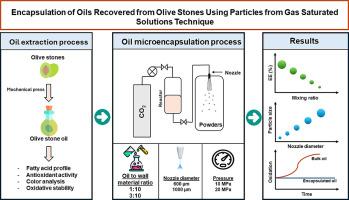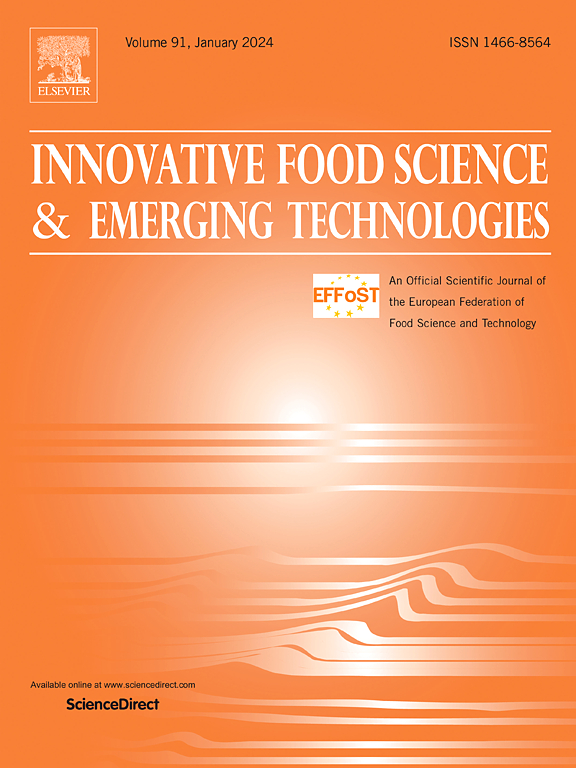利用气体饱和溶液颗粒技术封装从橄榄石中回收的橄榄油
IF 6.3
1区 农林科学
Q1 FOOD SCIENCE & TECHNOLOGY
Innovative Food Science & Emerging Technologies
Pub Date : 2024-10-01
DOI:10.1016/j.ifset.2024.103842
引用次数: 0
摘要
本研究探讨了如何利用气体饱和溶液颗粒(PGSS)技术封装从橄榄石(橄榄油生产的一种副产品)中提取的橄榄油。这种油含有大量油酸(72.1 ± 2.5 %)和亚油酸(16.4 ± 1.2 %),在 40 °C 下氧化稳定性为 34 ± 2 天。为了提高这种稳定性,在不同的压力(10 和 20 兆帕)、油壁材料比(1:10 和 3:10)和喷嘴尺寸(600 和 1000 微米)条件下,使用 PGSS 技术对油进行了封装。最佳封装条件为 10 兆帕、油壁材料比为 1:10、喷嘴尺寸为 600 微米。在这些条件下产生的微粒封装效率为 70.0 ± 4.2 %,卡尔指数为 20.5 ± 1.4 %,在 40 °C 下可将油氧化稳定性提高到 60 天。等温量热法、过氧化值和丙二醛水平都证实了这种提高。结果表明,PGSS 封装方法可显著提高油的氧化稳定性,从副产品中生产出适合食品和化妆品应用的粉末配料。本文章由计算机程序翻译,如有差异,请以英文原文为准。

Encapsulation of oils recovered from olive stones using particles from gas saturated solutions technique
This study explores the use of the Particles from Gas Saturated Solutions (PGSS) technique to encapsulate oils extracted from olive stones, a by-product of olive oil production. The oil, containing high levels of oleic (72.1 ± 2.5 %) and linoleic acid (16.4 ± 1.2 %), was oxidative stable for 34 ± 2 days at 40 °C. To improve this stability, the oil was encapsulated using PGSS technique under various pressures (10 and 20 MPa), oil-to-wall material ratios (1:10 and 3:10), and nozzle sizes (600 and 1000 μm). Best encapsulation conditions were found to be 10 MPa, 1:10 oil-to-wall material ratio, and 600 μm nozzle. These conditions produced microparticles with 70.0 ± 4.2 % encapsulation efficiency and a Carr index of 20.5 ± 1.4 %, improving the oil oxidative stability to 60 days at 40 °C. This enhancement was confirmed through isothermal calorimetry, peroxide value, and malondialdehyde levels. The results showed that PGSS encapsulation method may significantly improve the oil oxidative stability, producing powdered ingredients from by-products suitable for food and cosmetic applications.
求助全文
通过发布文献求助,成功后即可免费获取论文全文。
去求助
来源期刊
CiteScore
12.00
自引率
6.10%
发文量
259
审稿时长
25 days
期刊介绍:
Innovative Food Science and Emerging Technologies (IFSET) aims to provide the highest quality original contributions and few, mainly upon invitation, reviews on and highly innovative developments in food science and emerging food process technologies. The significance of the results either for the science community or for industrial R&D groups must be specified. Papers submitted must be of highest scientific quality and only those advancing current scientific knowledge and understanding or with technical relevance will be considered.

 求助内容:
求助内容: 应助结果提醒方式:
应助结果提醒方式:


